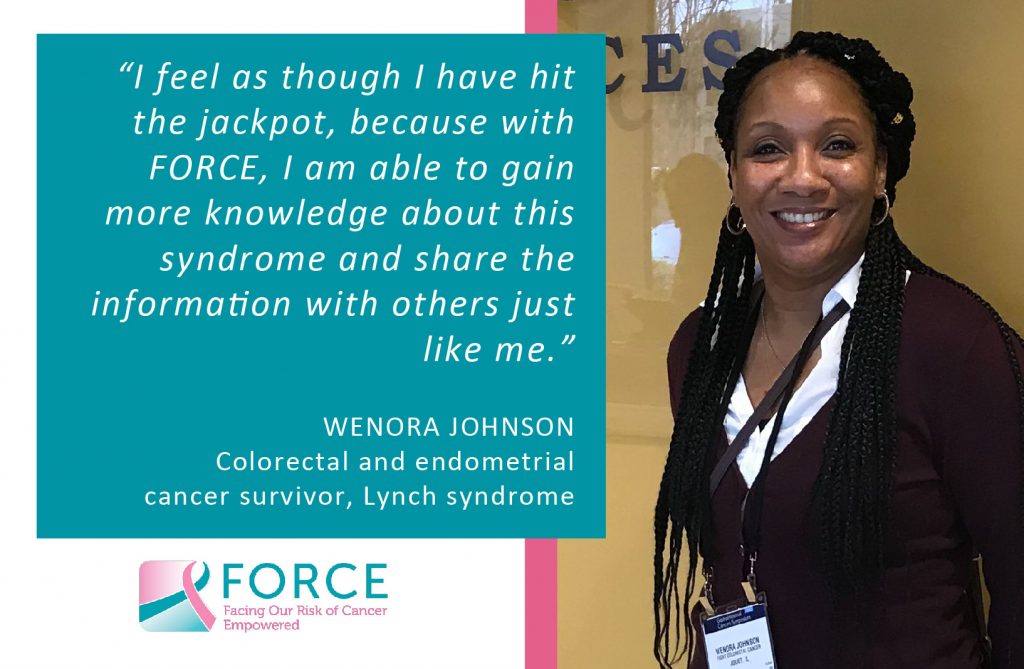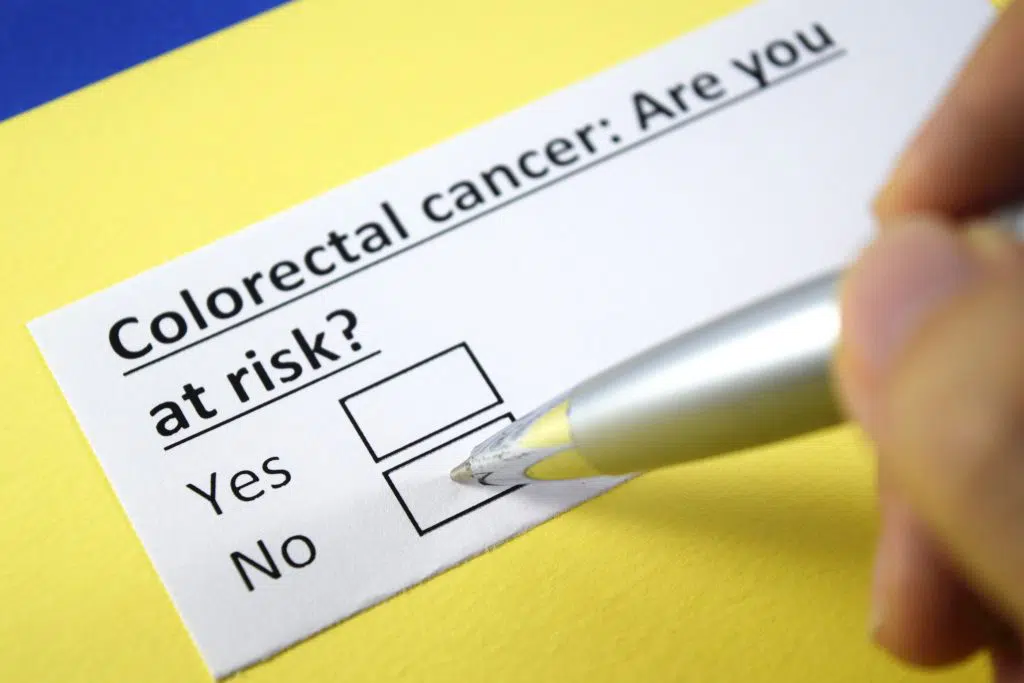After five years with no evidence of disease (NED), Wenora Johnson’s colon cancer returned and her oncologist recommended genetic testing. She tested positive for Lynch syndrome, an inherited syndrome associated with a genetic predisposition to different types of cancer.
Today, Wenora is a three-time cancer survivor, advocate and FORCE volunteer.
With Lynch syndrome Awareness Day on March 22, we asked her to share her story. It is one of positivity, hope and community support. We think you will be inspired as we are by her!
Here is what Wenora had to say:

One of my favorite quotes by author and pastor Charles Swindoll is, “Life is 10 percent what happens to you and 90 percent how you react to it.” These words kept me going after my diagnosis of stage IIIB colorectal cancer in 2011. I smile when I look back on that year, not because I battled this ugly thing called cancer, but because I drove my kids half-crazy with the inspirational quotes in giant letters that I posted throughout the house.
I was blindsided by my diagnosis. As a military reservist, my health had always been important to me. I exercised regularly, ate the right foods and received a clean bill of health every year from my doctor. The vast majority of people diagnosed with colorectal cancer are over 60, yet I was only 45 when doctors told me cancer had been growing inside me for almost 15 years.
I was determined to face the news with positivity. I underwent surgery and, after three months of chemotherapy, my troubles seemed to be over. The cancer was gone.
What I didn’t know was that I had Lynch syndrome.
Testing positive for Lynch syndrome
About 1 million people are estimated to have Lynch syndrome in the United States, but only around 5 percent are aware of their status. Caused by a hereditary genetic mutation, Lynch syndrome increases a person’s chances of developing more than a dozen types of cancer – especially colorectal and endometrial (uterine). Those affected often have a family history of cancer and run the risk of passing the mutation on to their children. They also tend to get cancer at an earlier age than the general population.
Other than my mother passing away from brain cancer, I had no warning signs that Lynch syndrome ran in my family in 2011. However, shortly after my own battle with cancer, my brother was also diagnosed with colorectal cancer. Then my aunt revealed that my grandfather had died from colorectal cancer at age 38. In light of this new information, my oncologist recommended that I undergo genetic testing in 2016.
I had been cancer-free for almost five years when I learned about my gene mutation. The more I researched Lynch syndrome, which is linked to a 60-80% chance of developing endometrial cancer, the more I knew that I couldn’t sit idly by and wait for illness to strike again. Healthcare professionals generally recommend that patients with Lynch syndrome have their ovaries and uterus removed by age 35, and I was already 15 years past that deadline.
Cancer resurfaces again
In 2016 I made the decision to have a total hysterectomy, and it wasn’t a moment too soon. When the surgeons biopsied my uterus, they found that I already had stage I endometrial cancer. Fortunately, I didn’t need further treatment because the cancer was removed before it had the opportunity to spread.
Since then, I’ve also been diagnosed with skin cancer on my back. As a person of color, I never would have suspected that what looked like a tiny pimple could be hiding a two-inch tumor beneath my skin. But knowing I have Lynch syndrome gives me an advantage when it comes to prevention. In my world, no abnormality goes unnoticed.
For Lynch syndrome patients, it’s normal to always be looking over your shoulder, waiting for when the next cancer may show up. My life depends on me staying one step ahead of the next diagnosis, which is why I follow an intensive screening regimen to detect cancers early. I see my primary care physician, oncologist, dermatologist, gynecologist and dentist at least once every six months.
Advocating for others
My experience has inspired me to work with multiple groups to advance cancer research and advocate for patients. This month, I hope to be a spark that ignites others to get tested. March is especially poignant for me. Not only is it Colorectal Cancer Awareness Month but the 22nd is also Lynch Syndrome Awareness Day.
FORCE has proven extremely valuable in my journey. The organization’s annual conference provides a rare opportunity to come together with hundreds of cancer survivors and previvors who are facing the same genetic challenges.
If members of your family have had colorectal or uterine cancer, please talk with your doctor or a genetic counselor about testing for Lynch syndrome. By arming yourself with knowledge, you can take power over your health, whether that means catching cancer early or preventing it altogether. Remember that life is 10 percent what happens to you and 90 percent how you react to it.
